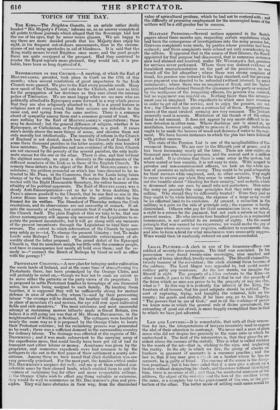LEGAL PLUNDER.—A clerk in one of the insurance-offices was robbed
of seventy-five sovereigns. The thief was convicted. In his possession were found twenty-nine sovereigns, nine -marked and capable of being identified, twenty unmarked. The Sheriff claimed the twenty because of the conviction ; the clerk claimed them because of the robbery. The Lord Mayor was appealed to, but could render neither party any assistance. As the law stands, we imagine the Sheriff is right. The property of a felon escheats to the King—in , other words, it goes to the Sheriff: now if that be not the property of the felon which no man can prove to be the property of any one else, what is ? In this way it is evidently the interest of the King, the fountain of all honour, that his good subjects should be robbed. The cost of capturing, trying, and hanging the criminal, falls on the county; his goods and chattels, if he have any, go to his Majesty. " The powers that be are of God ;" and in all the workings of power we know none in which the general rule of divine government, the extracting of good out of evil, is more happily exemplified than in that to which we have just adverted.


















 Previous page
Previous page